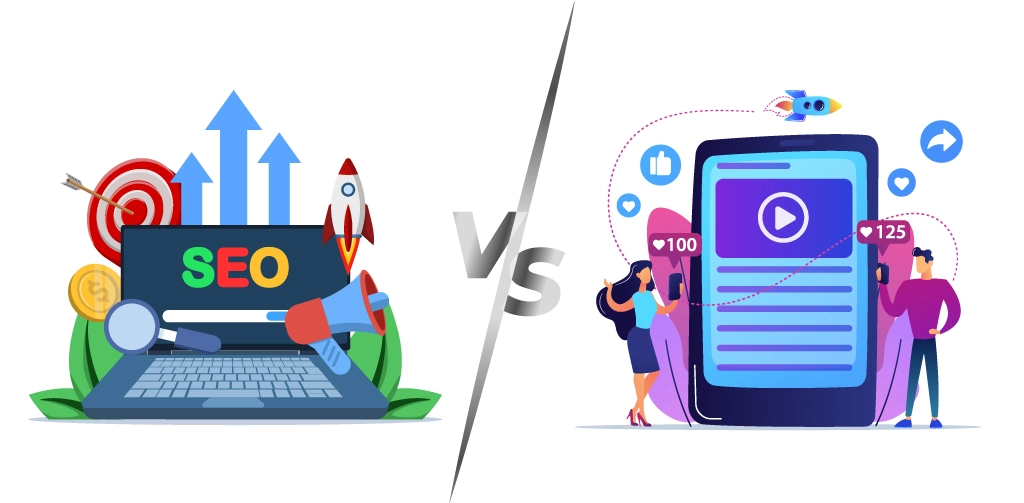SEO vs. SMM: Which Strategy Drives More Traffic to Your Website?

Introduction to Digital Marketing Strategies
In the fast-paced digital era, businesses rely on multiple marketing channels to increase visibility and drive website traffic. Among the most debated strategies are Search Engine Optimization (SEO) and Social Media Marketing (SMM).
Both play vital roles in digital marketing strategies, but they operate differently. This article explores SEO vs SMM, their strengths, weaknesses, and how businesses can decide which one suits their goals best.
The Role of Website Traffic in Business Growth
Website traffic isn’t just about numbers—it directly translates into leads, conversions, and brand authority. Without consistent traffic, even the most beautifully designed websites can’t generate meaningful results.
Why Businesses Debate Between SEO and SMM
The debate often comes down to budget, timelines, and business objectives. SEO is known for long-term organic visibility, while SMM shines in instant reach and engagement.
Understanding SEO (Search Engine Optimization)
What is SEO and How It Works
SEO is the process of optimizing your website to appear higher in search engine results for relevant keywords. For example, a bakery targeting “best cupcakes near me” can attract local customers through SEO.
Core Components of SEO
On-Page Optimization
Keyword-rich content, meta tags, and optimized images.
Off-Page Optimization
Backlinks, guest posting, and influencer mentions.
Technical SEO
Improved site speed, mobile-friendliness, and structured data.
Advantages of SEO for Website Traffic
- Generates consistent, long-term traffic
- Builds credibility and trust
- Cost-effective compared to paid advertising
Limitations of SEO
- Results take months to show
- Highly competitive industries may require significant investment
- Dependent on search engine algorithm changes
Understanding SMM (Social Media Marketing)
What is SMM and How It Works
SMM uses platforms like Facebook, Instagram, LinkedIn, and Twitter to promote products, engage with customers, and drive traffic back to your website.
Core Components of SMM
Organic Social Media Marketing
Content creation, community engagement, and brand storytelling.
Paid Social Media Advertising
Targeted ads with demographic and behavioral filters.
Advantages of SMM for Website Traffic
- Instant visibility and engagement
- Precise audience targeting
- Stronger brand awareness through visual storytelling
Limitations of SMM
- Traffic stops when ad spend stops
- Organic reach is declining on many platforms
- Requires continuous content creation
SEO vs SMM: A Comparative Analysis
Cost-Effectiveness and ROI
SEO requires upfront effort but offers sustainable results. SMM delivers faster ROI but demands continuous investment.
Speed of Results
SEO is a marathon; SMM is a sprint. Businesses wanting quick traction may prefer SMM.
Audience Targeting Capabilities
SEO targets intent-driven users searching for solutions. SMM allows businesses to proactively reach niche audiences.
Sustainability and Long-Term Impact
SEO provides compounding benefits over time, while SMM often requires ongoing paid support.
When to Choose SEO Over SMM
- When targeting long-term organic growth
- If the goal is to rank for high-value keywords
- When building trust and authority in an industry
When to Choose SMM Over SEO
- When launching a new product or service
- If targeting a young, social-media-active audience
- When quick visibility is needed
The Ideal Strategy: Combining SEO and SMM
How SEO and SMM Complement Each Other
- SEO content can be promoted through social media.
- Social engagement drives backlinks, improving SEO.
- A hybrid approach captures both intent-driven and interest-driven traffic.
Real-Life Examples of Hybrid Digital Marketing Strategies
A fitness brand can publish SEO-optimized blogs on workout tips while promoting short workout reels on Instagram. The combination ensures organic search traffic and social engagement.
Measuring the Impact of SEO vs SMM
Key Metrics for SEO Success
- Organic traffic
- Keyword rankings
- Domain authority
Key Metrics for SMM Success
- Engagement rate
- Click-through rate (CTR)
Follower growth and reach
FAQs on SEO vs SMM
Q1. Which is better for website traffic, SEO or SMM?
It depends—SEO provides long-term traffic, while SMM drives instant visibility.
Q2. Can I use SEO and SMM together?
Yes, combining both maximizes reach and results.
Q3. How long does it take for SEO to show results?
Typically, 3-6 months, depending on competition.
Q4. Which is more cost-effective, SEO or SMM?
SEO is cost-effective long-term, while SMM offers faster but short-lived returns.
Q5. Does social media impact SEO rankings?
Indirectly, yes—social signals can boost visibility and backlinks.
Q6. What’s the best strategy for small businesses?
A hybrid of SEO and SMM often works best, balancing budget and results.
Conclusion: Choosing the Right Digital Marketing Strategy
Both SEO and SMM are powerful tools, but the choice depends on business goals. If you seek sustainable growth, SEO is your go-to. If you need instant engagement, SMM excels.
The smartest businesses, however, don’t choose—they integrate. By combining digital marketing strategies, companies can maximize website traffic, brand awareness, and long-term growth.
👉 Ready to amplify your online presence? Start by blending SEO vs SMM into a powerful hybrid approach tailored to your business.
